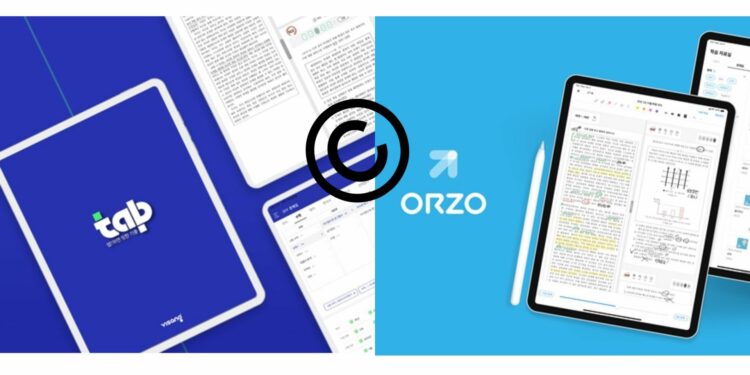With innumerable startups launching every day globally, numerous ideas are born too, but sometimes there are clashes of ideas, where similar businesses end up with similarly designed products. Korean Edutech startups Sling and Visang Education are in the middle of a ‘plagiarism battle’ over a tablet-only CSAT learning service. Sling, an Edutech startup, released a CSAT study app service, the Orzo app, in November 2020. Visang Education released a similar problem-solving app, Tab, in December 2022 with a split function.
Sling’s Orzo provides a learning experience in a tablet and smart pencil environment. Users can learn various past questions, workbooks, and private mock tests within the app. Learning management is possible through automatic scoring, a timer for each question, incorrect answer notes, and a study planner. Sling has registered design patents for Orzo’s problem-solving screen, split function, and function to conveniently adjust the size of the left and right divided areas.
Visang Education’s Tab is also an exam-learning app that can be learned with a tablet PC like Orzo. The app provides a split function that allows users to see the problem-solving and commentary screens at a glance. Sling has said that Visang Education’s Tab has similar design elements in the display based on the shape of a rectangular test sheet, the OMR display at the top of the test sheet, the red circular scoring display, and the presentation of vertical 2-part questions and answers.
An official from Sling said, “The problem-solving screen, the split function, and the ability to conveniently adjust the size of the left and right divided areas are the same as Orzo. It is incomprehensible that Visang Education insists that a design for which a patent has been registered is a general design.” Sling has sent a certificate of contents related to this to Visang education.
On the other hand, Visang education has refuted the allegation stating that it is a design commonly used in the education industry. In a statement released, Visang Education said, “The 2-split dynamic design that divides the screen in terms of multitasking is a unique characteristic of smart devices, and the ability to adjust the size of the divided screen in that application is a natural user interface provided, and cannot be seen as an infringement of design rights.”
In addition, the statement said, “Design is a right granted only to the shape and combination of shapes or shapes shown on the registered drawing, but if that includes other than dynamic designs to the modified Design, this is the right of Design under the Design Protection Act. It is over-interpreted.”
Meanwhile, Sling replied to the statement saying, “The statement of Visang Education is not true and is cleverly distorting the essence of the problem. The claim that it is a natural user interface and Design is a compelling argument that devalues the Design of Sling legally registered with the Korean Intellectual Property Office and cleverly distorts and obscures the nature of the problem.”
As per Sling’s claims, the feature did not exist at the time of the Orzo launch in November 2020, and the app was initially serviced with a fingerprint problem attached in an undivided form. After receiving feedback from students that such a design was inconvenient, the current “2-split screen design” was developed and launched and received a favorable response.
“Visang Education launched a service two years later than Orzo with a similar design that could raise suspicions of plagiarism. It sold a design Sling repeatedly developed through trial and error and recognized an intellectual property right as a natural design’. It is a huge insult to a startup that developed with sweat and blood and acquired intellectual property rights with insufficient funds,” Sling said in a statement.
Next, Sling said, “Visang Education released an official statement that skillfully distorted the facts with incorrect information. This act is a serious legal and social problem. It is a contradictory move that does not match the position of respecting intellectual property rights and pursuing mutual growth through good competition, which the company advocates. Launching applications and not recognizing registered intellectual property rights should stop.”
Sling attracted initial investment from Naver Spring Camp at the Orzo service launch. It was selected for TIPS, a technology startup support program by the Ministry of SMEs and Startups, and C-Lab Outside, a startup fostering program by Samsung Electronics. Since then, it has attracted a series A investment of 7 billion won in October.
Also Read,
- Edutech startup Team Sparta introduces conversational ‘ChatGPT’ for its coding club site
- Apollo EduTech’s game ‘Unicorn Ninjas’ teach coding to kids without logging on to computers
- Korean authorities launch investigations against Lotte Healthcare over Algocare Healthcare ‘copycat’ allegations
- Korean edutech solution ‘Mathflat’ registers average maths score growth in student users






